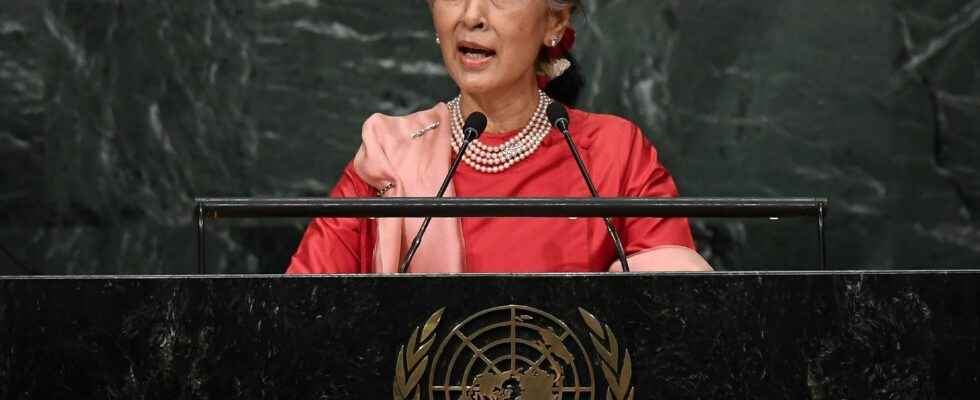Twenty-six years in prison, and soon up to seventy-five more years for Aung San Suu Kyi? Early next week, a court controlled by the military regime will deliver its verdict on the final five corruption charges – each bribery charge worth up to 15 years in prison – which the Nobel peace laureate denies. After 18 months of a river trial, the Burmese junta will therefore close the last chapter of its legal battle against him during this trial behind closed doors.
The 77-year-old former Myanmar leader has been a prisoner since the military overthrew her government in February 2021, ending a decade of democratic transition in the Southeast Asian country.
Incarcerated in a prison in the capital Naypyidaw, near the courthouse where her trial is taking place, she has already been found guilty of 14 counts of corruption, illegal importation of walkie-talkies and violation of anti-Covid restrictions. .
Judicial harassment aimed at permanently removing him from power?
Many voices denounce a judicial harassment which would be based on political motivations, with the aim of definitively dismissing the daughter of the hero of independence and the big winner of the legislative elections of 2015 and 2020.
Since the start of her trial, the detainee has only been seen once – in grainy photos taken by state media in an empty courtroom – and has had to rely on her lawyers to convey its messages to the whole world. Journalists were barred from attending the hearings and Aung San Suu Kyi’s lawyers were banned from speaking to the media.
But the military regime in power in Burma does not intend to change its methods. Friday, December 23, the junta also accused the UN of wanting to “destabilize” the country. She denounced the resolution adopted on Wednesday December 21 by the UN Security Council – for the first time in decades – calling for an end to the violence and the release of political prisoners, including Aung San Suu Kyi.
A possibility of grace and liberation?
The verdict on each of the five counts against Aung San Suu Kyi is expected to be delivered shortly after the closing arguments, likely Tuesday, December 27. The five bribery charges relate to the hiring of a helicopter by a government minister. Aung San Suu Kyi is accused in this case of not having respected the rules and of having caused “a loss for the State”.
However, it is “unlikely” that the junta will bring other charges, said Richard Horsey of the International Crisis Group to AFP. The army wants the focus next year to be on the celebrations of the 75th anniversary of Burmese independence from Britain, “and on the elections which it should organize in the middle year,” he said. But after these elections, any new military regime “could perhaps approach Aung San Suu Kyi and try to use these negotiations to try to divide the opposition”, adds Richard Horsey.
Analyst Soe Myint Aung believes there is “always a possibility of a pardon and unexpected release” for the 1991 Nobel laureate once her trial is over. “The military regime certainly sees a role for Aung San Suu Kyi in reducing social tensions and stopping armed resistance,” he says.
“I seriously doubt that the junta will release her from prison”
Whether the ever-popular ex-leader would play along in exchange for a pardon or freedom is the subject of intense speculation. “There is nothing impossible in politics,” junta spokesman Zaw Min Tun told AFP in July when asked if the army would consider talking to the leader. of the opposition, to find a way out of the turmoil in which the country is plunged.
The army explained its putsch by claiming to have discovered more than 11 million irregularities during the legislative elections of November 2020, massively won by the National League for Democracy (NLD) of Aung San Suu Kyi. “I seriously doubt that the junta will release her from prison, at least until the end of the 2023 elections,” said Htwe Htwe Thein, associate professor at Curtin University in Australia.
According to Richard Horsey, it is also “unlikely” that the generals will allow her to return to the family mansion in Rangoon, where she spent about 15 years under house arrest after winning the elections in 1990. During this period, she regularly gave speeches to the crowds gathered on the other side of her garden wall, becoming a global icon of democracy for her peaceful resistance to authoritarian military rule.
